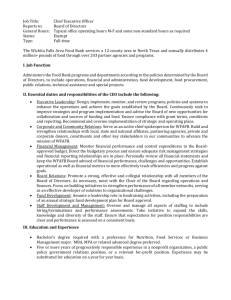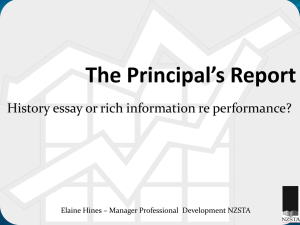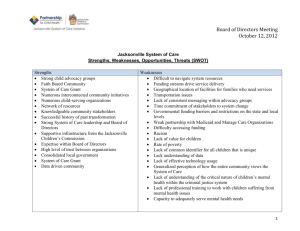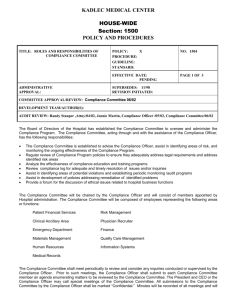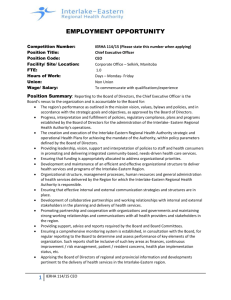Module 6 - Solomon Islands Chamber of Commerce and Industries
advertisement
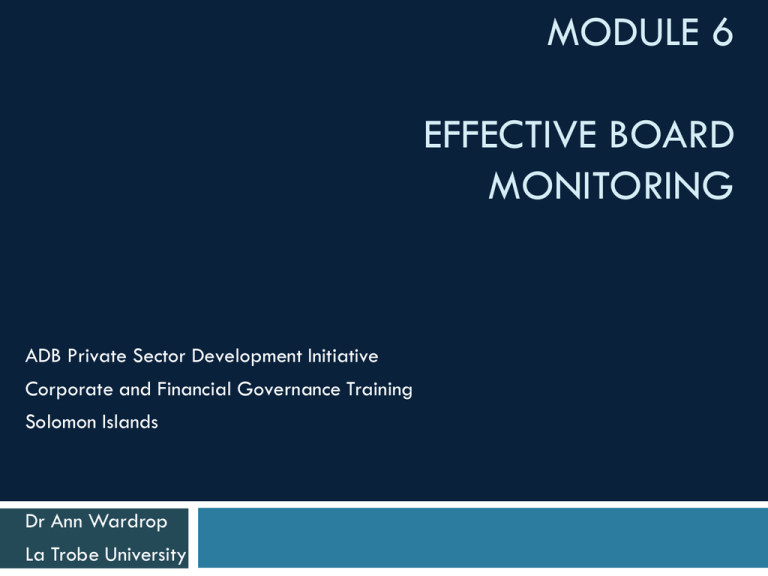
MODULE 6 EFFECTIVE BOARD MONITORING ADB Private Sector Development Initiative Corporate and Financial Governance Training Solomon Islands Dr Ann Wardrop La Trobe University Acknowledgement These materials were produced by the Asian Development Bank’s Pacific Private Sector Development Initiative (PSDI). PSDI is a regional technical assistance facility co-financed by the Asian Development Bank, Australian Aid and the New Zealand Aid Programme. Module 6 Outline 3 Effective board monitoring Board meeting frequency What kind of information reports should the board receive? How should the information be presented? Performance review Guidelines for developing performance measures Assessing the CEO Assessing the board and individual directors Effective board monitoring 4 The previous module discussed why plans are needed and how they are reported externally as part of the company being accountable to its stakeholders. This module will examine the question how does the board internally monitor the company’s performance? Effective board monitoring 5 Recall that ‘monitoring’ is one of the board’s critical roles. Oversight extends to all aspects of the company’s objectives: operational, strategic, and financial. Board also assesses the CEO Board should also assess itself and individual directors Effective board monitoring 6 To perform this function it must have: An effective reporting system Relevant timely What kind of information/reports should the board receive? Effective board monitoring 7 Board information should include: Key results indicators of business compared to: Plans, strategic, annual, and others Timing of reports will differ: Strategic Business review annually plan quarterly or monthly Effective board monitoring 8 Object of reports to board should show overall performance to ensure board focussed on strategic issues and not detail of management Following monthly report items should include: Actual result against budget Year to date Results for previous year Forecast for next quarter and year-end Board report 9 General Overview of operations Financial Profit and loss, balance sheet, cash flow, capital expenditure Working capital trends and analysis Loans Foreign exchange exposure Sales Costs Archer & Thornton, "Seeing the wood for the trees" Co Dir Magazine (2012) Board report 10 Non-financial reports Human resources Relevant committee reports for particular meetings Progress against strategic plans Board reports 11 Too much information or not enough time to review information This is an area of risk for the board Board needs to consider what information they need in line with directors’ duties Director packs can be large No defence to say that you have been provided with too much information Board reports 12 If there is a lot of information then you need to ensure there is sufficient time to read it The board controls the information it receives so work with management to ensure it provides information in a format that is useful for the board. One mechanism used: dashboard reporting Reporting dashboard 13 *Image by Klipfolio: http://www.klipfolio.com Dashboard reporting 14 Useful, also has its limitations If too much information over a large variety of factors, can be just as confusing to read If dashboard highlights any problems the detail of the problem should be provided in a separate report Performance review and its relationship to planning 15 Plans Performance review Strategic 5 year plan Sets the long term objectives Annual review of strategic plan Reviews progress and relevance of strategic plan reported to the board Annual business plan Quarterly review of business plan Sets out annual objectives and initiatives that are determined in relation to strategic 5 year plan Reviews progress and reported to the Board Divisional plan Monthly performance review of the division Sets out detail of how annual plan is to be implemented Reported to the CEO/management and forms the basis of report to the board Performance development plans of staff Annual performance reviews Guidelines for developing performance measures 16 Board’s role is to oversee management set up a workable planning program that is linked to performance review Performance measures or key performance indicators (KPIs): valid verifiable global communicable achievable Kiel, et al, Directors at Work (2012) Guidelines for developing performance measures 17 Number of performance measures of the business should not be excessive; Assessment of the business should not only relate to financial performance “Balanced scorecard” approach Financial Customer Internal processes Learning and growth Guidelines for developing performance measures 18 If badly designed lead to “gaming” by executives and staff Lead to short termism Gaming reduced by better design and a valuesdriven culture in the company Are managers acting within organisational values Conduct Look staff attitude survey at rates of absenteeism, sick leave and retention rates Assessing the CEO 19 Agree performance indicators and their objectives Are they related to remuneration? Should Mix be related to strategic plan of quantitative indicators and qualitative indicators Qualitative Heavy indicators not easily be measured emphasis on annual financial indicators – short termism Assessing the CEO 20 Chair or committee carry out the assessment Informal discussions or written questionnaire Companies with resources engage outside consultants to facilitate corporate governance Assessing the Board and Individual Directors 21 Can be a sensitive issue In addition to usual methods (co performance) formal performance appraisal should be used Review of board and individual directors should be annual, gaps identified previously form basis of following year review Review entire board and its mix of skills, diversity Are there regular meetings? Reports sent on time so members can read? Minutes kept? Review of individual directors 22 Questions to be asked: ‘Do the directors understand the company business and strategy? Do they stay abreast of current issues and trends in the industry? Do they attend all board and committee meetings? Are they well prepared and do they actively contribute? Do they challenge management when necessary? Do they effectively enquire into major performance deficiencies?’ AICD, Appraisal of Board and Individual Directors: Director Q&A (2013) Effective board monitoring 23 Exercise


